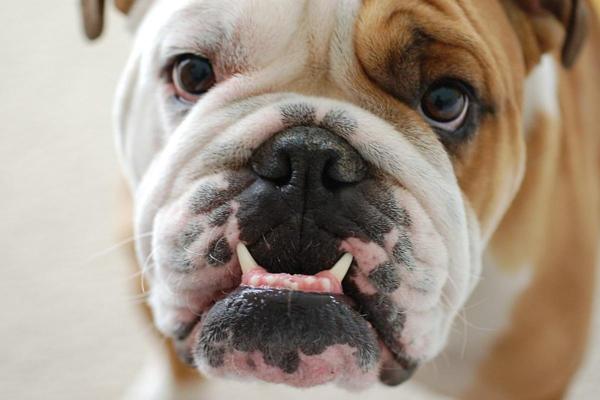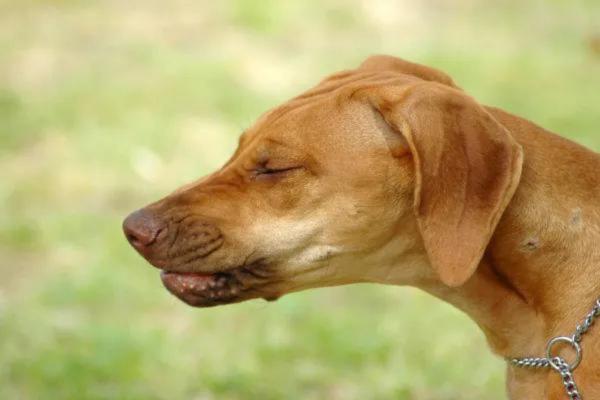My Dog Is Grunting Like a Pig



See files for Dogs
Some dogs will naturally make more sounds than others. This can be especially so after they have exercised or been involved in some strenuous activity. Some noises can appear all of a sudden and should alert us to a problem. The nature of this problem can be varied, so it is very important we look at the specific sound they make as well as the context in which they make it. When our dog makes a grunting noise, it will make us think there is some concern with their respiratory system.
At AnimalWised, we find out why my dog is grunting like a pig. We look at both the causes of this issue and the possible treatment options available for each one.
Reverse sneezing
When we notice a dog reverse sneezing for the first time, it can be quite disconcerting. This is due to the strange noise they emit when doing so, something which can sound like a pig's grunt. Fortunately, it sounds much worse than it is.
When a dog sneezes, they expel air rapidly from the respiratory tract through their snout. Reverse sneezing is the reverse, i.e. air is inspired rapidly into the upper respiratory tract. During a reverse sneeze, the dog will remain still with their mouth closed and their neck extended. They will make a loud inspiratory sound which can resemble a pig grunting.
Although this sound can be alarming and even sound like the dog is suffocating, it is important to know they should not be at any risk. Unless they have an additional condition, air is not prevented from entering the airways, so they are able to breathe. The grunting sound is simply the rapid inhalation of air which causes no harm to the animal.
Generally speaking, the reason a dog reverse sneezes is due to a muscle spasm in the upper respiratory tract. It is generated by agents which agitate the respiratory mucosa, agents such as dust, strong, odors, chemical vapors or even very tight collars. In the case of brachycephalic dogs, inverted or revere sneezing is especially common due to the morphology of their respiratory system.
Revere sneezing usually lasts around 30 seconds and will abate once the dog is able to swallow. We do not need to provide any treatment if there are no complications. There is something we can do to help shorten a reverse sneeze and allow the dog to breathe normally again. We do this by:
- Gently covering the nostrils to force the animal to open their mouth and swallow.
- Massage the throat area of the neck to stimulate swallowing.
If you notice that your dog is becoming stressed by performing any of these maneuvers, it is preferable to stop and simply wait for the sneezing episode to end naturall. Similarly, if you notice your dog suffers from this type of episodes on a recurring basis or if episodes last a long time, it is important that you go to your trusted veterinarian. They can discern if there is any underlying problem such as a respiratory tract infection which could be the cause.
Read our related article on stertor in dogs to learn more about reverse sneezing.

Brachycephalic syndrome in dogs
Brachycephaly is a condition in dogs which results in a misshaping of the skull. It results in various anatomical chages, including a shortened skull and an elongated soft palate. Although the skull is mainly affected, it will have an affect on various parts of their body, including the respiratory tract. This is what results in something known as brachycephalic airway syndrome in dogs.
Due to alterations of the respiratory tract, airways which would normally be fully open are constricted. The result is that air passing through them makes different noises, including snorting, snoring and the dog grunting like a pig.
Dogs with Brachycephalic Syndrome may present one or more of the following respiratory disorders:
- Nostril stenosis: very small nostrils.
- Elongation of the soft palate: the soft palate is so long its end protrudes into the airway, making it difficult for air to enter. It is the most frequently found abnormality in brachycephalic dog breeds.
- Laryngeal collapse: the rigidity and support provided by the laryngeal cartilage is lost, causing the larynx to fold and collapse.
- Tracheal hypoplasia: incomplete development or underdevelopment of the trachea.
- Pharyngeal hyperplasia: incomplete development or underdevelopment of the pharynx.
- Aberrant nasal turbinates: nasal mucous folds are exuberant and make it difficult for air to enter.
In addition to grunting like a pif, these dogs often have respiratory distress, intolerance to exercise and heat, cyanosis, syncope and digestive symptoms. The latter include vomiting and regurgitation of food since their esophagus is also contrcited. It is especially common in dogs that eat too fast.
It should be noted that the appearance of continuous snoring or respiratory distress with small efforts should never be considered normal, even in the case of brachycephalic dogs. These alterations greatly compromise the well-being of the animals.
If your dog is brachycephalic and you have observed they present any of the symptoms compatible with this syndrome, it is important you go to a veterinarian. They will be able to assess their health risks and provide practical information about their care. In some cases, surgical intervention may be required to help airflow in the respiratory tract.
Unfortunately, the face shape and other features caused by brachycephaly in dogs is often a desired trait in breeds. Although we love any dog regardless of their condition, it is important not to propagate health risks which lower a dog's quality of life. For this reaosn, we promote responsible breeding which takes into consideration issues such as brachycephalic airway syndrome.

Rhinitis
Rhinitis is another common cause of grunting in dogs. This is a pathological issue which can be of varying degrees of severity. It is an inflammatory process, specifically causing an inflammation of the nasal mucosa. When this occurs, the enlarged mucosa cause the airways to be constricted temporarily. This causes the air to be compressed when traveling through the respiratory tract and results in the dog grunting like a pig.
The causes that can cause rhinitis are varied and include the following:
- Infectious processes: due to viruses (such as canine distemper virus), bacteria (such as Bordetella or Streptococcus) or fungi (such as Aspergillus or Penicillium).
- Irritants: such as dust, smoke, pollution or vapors generated by chemicals (such as cleaners or varnishes).
- Foreign bodies: often small pieces of natural material which are inhaled when the dog sniffs their environment. A common and particularly nasty foreign body is foxtails in dogs.
- Tumors: both benign and malignant.
- Allergens : such as pollen or dust mites.
Depending on the cause, nasal discharge may vary in color and density. It may be serous which appears as a thin clear discharge or mucosal if the dog's discharge is thick and green. Whether due to blood vessels burst due to continued grunting or more serious nasal damage, it is also possible to see blood from the dog's nose. When these symptoms are observed for a prolonged period, it is important we take them to a veterinarian.
Treatment of rhinitis should be established based on the cause that triggered the process. For example, in infectious processes an antimicrobial treatment will be prescribed and tumors may require surgical intervention. For other issues such as allergies in dogs, we should ensure we avoid the allergen in the dog's environment and can manage symptoms with mucolytics or expectorants. The latter should be prescribed by the veterinarian.
Grunting like a pig is only one symptom of respiratory distress in dogs. Learn other causes, symptoms and treatment with our article on dog breathing difficulties.

This article is purely informative. AnimalWised does not have the authority to prescribe any veterinary treatment or create a diagnosis. We invite you to take your pet to the veterinarian if they are suffering from any condition or pain.
If you want to read similar articles to My Dog Is Grunting Like a Pig, we recommend you visit our Breathing diseases category.







